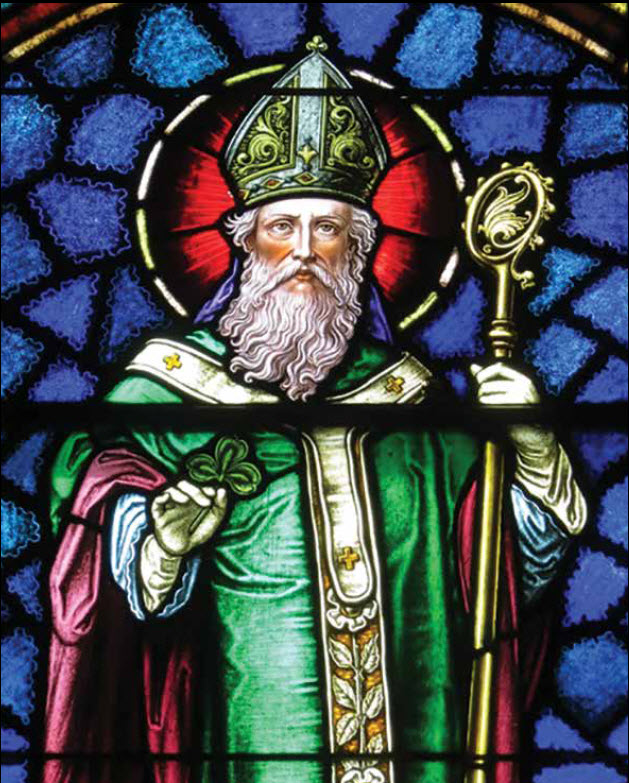By: Mae Lewis
I’ve never paid much attention to St. Patrick over the years. Like the stories of King Arthur, I am convinced that the myth has become greater than the man. Nevertheless, he pops up every year around this time and has us all pinching each other.
My February article, “The Importance of Holidays,” had me examining St. Patrick’s Day a little more closely. Why should we care?
Almost every source concurs that St. Patrick is venerated because he brought Christianity to Ireland. He is one of Christianity’s earliest missionaries, and one of the most important figures in Irish history. He was born somewhere between 340 and 370 AD and most likely died in 460 AD. We celebrate St. Patrick’s Day on the day of his death, March 17th.
What I found most surprising about St. Patrick is when he lived. He was a Roman citizen at the height of the Roman Empire. Christianity had been persecuted until about 324 AD, when Constantine became the first Christian Roman Emperor and made Christianity the official religion of Rome (This is understood to be the beginning of the organized Catholic Church). St. Patrick was originally born in Britain (on the very outskirts of the Roman Empire) and his grandfather had been a priest. Patrick heard the Gospel as a young boy but was uninterested. At the age of 16, he was kidnapped by Irish pirates and brought to Ireland as a slave. He worked six years in captivity, during which time he prayed to God to rescue him, and he converted to Christianity. Guided by a dream, he made a daring escape and was reunited with his family in Britain.
I always assumed that Patrick’s foray into Ireland was much later, during the times of castles and knights, but it was much sooner. For context, the Bible was officially compiled in 397 AD, and it was translated into Latin for the first time in 405 AD!
As a Roman citizen, Patrick would have been in an alien land — the equivalent of the darkest jungles of Africa! The people of Ireland were perfectly pagan, and virtually untouched by the Roman Empire (which only extended into Britain). Rome didn’t even know that Ireland existed until 170 AD! It was populated by a warrior group of Celts and ruled by terrifying druid priests and superstition. Patrick would have become very familiar with their practices and beliefs during his youth there.
A few years after returning to Britain, Patrick had a vision that the people of Ireland were crying out to him and asking him for guidance. He then worked to be ordained into the priesthood and returned to Ireland. Upon his return, he boldly challenged the druid priests by lighting a forbidden bonfire on a sacred night on a sacred hill and declared that Christianity had come to Ireland. He worked in Ireland for the rest of his life, constantly facing imprisonment, starvation, and martyrdom. His prayers resulted in miracles, and his humility and poverty were renowned.
According to works that he wrote himself, he baptized thousands of people, including his captors. He taught them how to read, and the combination of literacy and conversions led to an enormous cultural shift, ushering in a new era. He single-handedly led Ireland out of the Dark Ages and into a period of enlightenment and economic stability that lasted for almost 400 years. According to legend, he used the 3-leafed shamrock to teach his converts about the Trinity, passing the shamrock into the faith and cultural identity of the Irish.
So what are we to take from St. Patrick? The story of his life is one marked by forgiveness. Even under the best of circumstances, being kidnaped and taken into slavery during this era would have had many horrors. Yet, he chose to return to the land of his captivity and risk his life to bring the gospel to his captors. He was able to overcome his past and strive against impossible odds to cause a massive cultural shift in this dark corner of the world. He did not see himself as a victim, but as a light to a lost people.
I find it fitting that St. Patrick’s Day happens during Lent. As we approach Holy Week and find ourselves turning inwards on spiritual matters, let St. Patrick’s Day be a reminder to forgive those who have wronged us, to want the best for them, and to work to change the narrative of our lives.
By: Mae Lewis









 June 20, 2025
June 20, 2025



